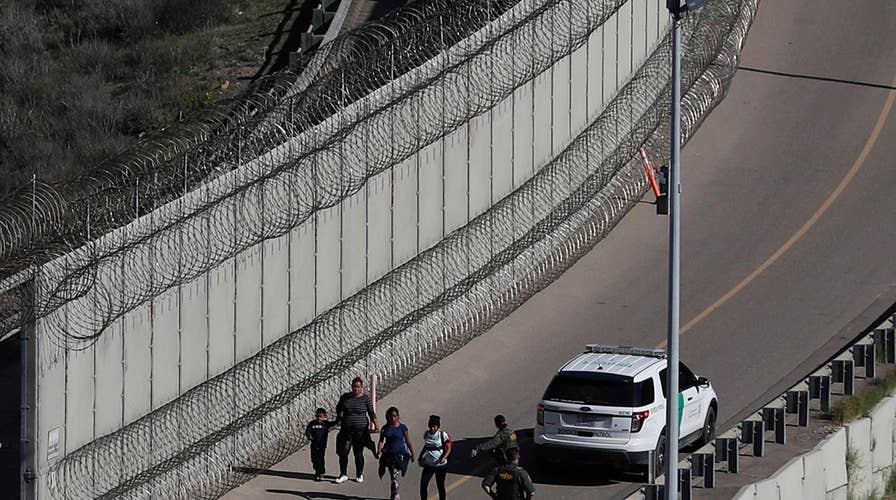US Border Patrol arrests continue to drop in August
Does this mean President Trump's policies are working? National Border Patrol Council president Brandon Judd weighs in.
Immigration officials apprehended just over 64,000 migrants at the southern border in August – a dramatic drop that the Trump administration is presenting as a sign its diplomatic engagement with Mexico and other countries is having positive effects on the ground.
The 64,006 migrants apprehended or deemed inadmissible represents a 22 percent drop from July, when 82,055 were apprehended, and a 56 percent drop from the peak of the crisis in May, when more than 144,000 migrants were caught or deemed inadmissible. While the numbers typically drop in the summer, the plummet is steeper than typical seasonal declines.
HOUSE REPUBLICANS DEMAND DETAILS ON DEMS' MYSTERIOUS TRIPS TO MEXICO
Meanwhile, the number of caravans has also dropped. In May, 48 caravans of migrants were recorded coming to the U.S. In August, the tally was six. Border Patrol now has fewer than 5,000 migrants in custody, down from 19,000 at the peak in the spring.
The Trump administration says that while the numbers are still at crisis level, the numbers show the extent to which Trump policies -- such as the Migrant Protection Protocols (MPP) that keep migrants in Mexico as their asylum cases are heard -- are working and that countries south of the border are taking action to stop the flows in response to pressure from the U.S.
“That international effort is making an impact. Mexican operational interdiction is certainly [the] highlight of that effort, but the shared responsibility we’re seeing in the region, governments stepping up and saying we also own this,” Homeland Security Secretary Kevin McAleenan told Fox News on Monday.
A senior administration official also said "the tariff threat with Mexico changed the dynamic significantly with our partners."
Trump announced in May that he intended to impose tariffs on Mexico if it did not help the U.S. combat the migration crisis. Trump ultimately suspended the tariffs after a deal was reached that included Mexico taking “unprecedented steps” to boost enforcement, including deploying its National Guard, while the MPP, known informally as the “Remain in Mexico” policy, was expanded.
Mexico has now been giving those migrants a permit to remain, work authorizations and social security and providing free transportation to anyone who wants to return to their home countries.
A senior administration official pointed to engagement with countries in Central America and agreements made with Honduras, Guatemala and El Salvador on issues such as human smuggling – the main countries sending migrants to the U.S. The official said that Honduras has so far more than doubled its border force after the U.S. requested they triple it.
Meanwhile at home, the U.S. is pushing through a change to the Flores court settlement which limits how long minors can be kept in custody, as well as a rule (currently facing court challenges) that says that migrants cannot claim asylum if they have passed through other safe countries. It is also eyeing expanding DNA tests on migrants claiming to be family units.
CLICK HERE TO GET THE FOX NEWS APP
Now, the official said, instead of releasing almost all family units into the U.S., the majority of families are being kept in Mexico or being returned home.
But the numbers are still higher than August last year. Customs and Border Protection Acting Commissioner Mark Morgan called the work being done by the administration a “game changer” but warned that Congress needs to act in order for that work to be sustained.
“For this to be a durable, lasting positive impact to address this crisis, Congress has to act," he told reporters at a briefing Monday. "It has to pass meaningful legislation that we’ve been telling them for a long time they need to do to effectively address the loopholes in our current legal framework.”
However, with House Democrats increasingly taking liberal positions on illegal immigration issues, fueled by 2020 candidates who have been embracing policies such as closing detention centers and giving health care to illegal immigrants, the future of congressional action is unclear.





